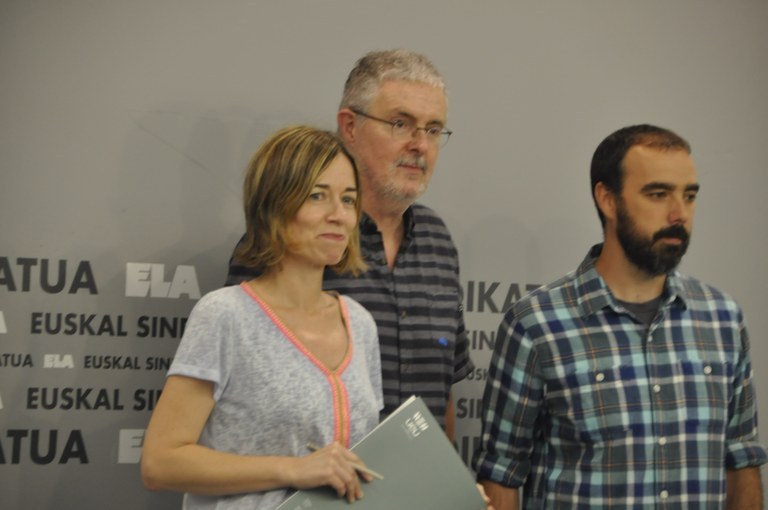In 2018 ELA is presenting around 100 agreements with effective achievements against job insecurity

Alongside the general secretary, Adolfo Muñoz "Txiki", Pello Igeregi and Leire Txakartegi, who are in charge of collective bargaining and gender equality within the trade union, took part in the presentation of the report on the development of company and sectorial negotiation in the first half of 2018.
To give a few examples, at the territory of Gipuzkoa Accommodation sector the subrogation of the outsourced staff has been achieved (particularly important in multi-service companies in hotels) and the application of this agreement has been obtained for cleaning workers of tourism apartments, a subsector that is particularly insecure and has virtually no labour protection in the rest of the State. Also in Gipuzkoa, the workers in the textile trade have obtained compulsory rest time at the weekend and in the Building sector a historical agreement has been reached with the recovery of purchasing power, subrogation for the maintenance staff and a guarantee unheard of in our environment: the main companies must pay outsourced personnel all the amounts that they are not paid by the companies that subcontract them.
At the territory of Araba Freight Transport, the logistics employees have become subrogated, whilst in the Navarre Sports Management the way has been closed to the labour reforms of 2011 (Zapatero) and 2012 (Rajoy), amongst other achievements.
The clauses to leave these reforms out of the companies are precisely the badge of ELA’s collective bargaining and this is included in the agreements that our trade union signs. Therefore, the curb to outsourcing, indefinite subsisting consequences (or at least much longer than the legal time), the obligatory application of the signed agreements (that is to say, preventing unilateral opting out) and the elimination of the salary gender gap (or of unwanted part-time work) are amongst others, the distinctive characteristics of ELA’s collective bargaining.
Accordingly, when the bargaining tables can go no further, resorting to a strike to move the conflict in favour of the working class has been a key element for reaching these achievements in 2018. The qualitative leap in collective bargaining in 2018 has come hand in hand with an important increase in labour conflict. The number of strikes carried out by ELA has risen by 81% and in the most precarious situations, in female-dominated sectors, these have been indefinite strikes. To do this, the Strike Fund has been shown to be an essential instrument.
This explains the fact that in many work centres they have reached salary increases of 15, 20 and even 54%, in addition to important reductions in working hours. These realities of trade union success have only one explanation: the people organised in the trade union.
